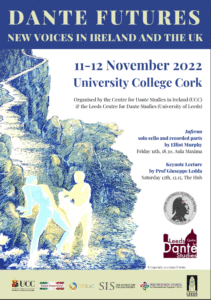Organised by the Centre for Dante Studies in Ireland and the Leeds Centre for Dante Studies
The two-day conference “Dante Futures: New Voices in Ireland and the UK”, hosted by University
College Cork on November 11 and 12, saw the participation of many PhD scholars and Early Career
Researchers in Dante Studies from the anglophone world.

The event was co-organised by members of the Centre for Dante Studies in Ireland (Elsina Caponetti, Dario Galassini) and of the Leeds Centre for Dante Studies (Camilla Bambozzi, Carmen Costanza), and sponsored by the Italian Department and CASiLaC, UCC, the Irish Research Council, and the Society for Italian Studies. The purpose of the event was to give the new generations of researchers in Irish and UK Dante Studies a space to present the latest outcomes of their rerch in front of peers and to receive feedback from Professors and experienced researchers, while also building up a sense of enlarged community over the years. Panels included a wide variety of topics related to Dante
Studies (e.g., reception, intertextuality, religion, theology, philology).
The conference consisted of five panels, for a total of thirteen papers, one roundtable, one keynote
lecture, one book launch, and one concert. It started on Friday 11th with the first panel, “New
Perspectives in Reception Studies”, chaired by Dr Federica Coluzzi (Warwick), with papers by Chiara
Valcelli (UCC), Dario Galassini (UCC), and Francesca Speranza (Pisa – TCD visiting). The second
panel of the day, “Voicing Dante’s Communities”, was chaired by Dr Valentina Mele (Leeds), with
papers by Camilla Bambozzi (Leeds) and Dr Aistė Kiltinavičiūtė (Cambridge).
The panels were followed by the book launch of the volume The Afterlife of Dante’s “Vita Nova” in
the Anglophone World, edited by Federica Coluzzi and Jacob Blakesley (London: Routledge, 2022).
The book was launched by Dr Lorenzo Dell’Oso (Göttingen), with the participation of the co-editor
Federica Coluzzi and three contributors, Dr Valentina Mele, Dr David Bowe, and Dr Daragh
O’Connell.
The public music performance of Inferno, composed for solo cello and recorded parts by Irish
musician Elliot Murphy, closed the first day of the conference.
The second day started with the panel “The Commedia and its Hypotexts”, chaired by Dr Leyla
Livraghi (Pisa), with papers by Elsina Caponetti (UCC), Gianluca Caccialupi (TCD), and Rosemary
Williams (St. Andrews). The fourth panel, “Dante and Science”, was chaired by Dr Serena Vandi
(Oxford), with papers by Carmen Costanza (Leeds) and Frey Kalus (Cambridge).
Then, Prof Giuseppe Ledda, from the Università di Bologna, delivered his keynote lecture entitled
“A Controversial Guide: Dante’s Vergil Between Honour and Failure”.
The fifth panel, “Futures Lines to the Commedia” followed, chaired by Dr Lorenzo Dell’Oso
(Göttingen), with papers by Jonny Wiles (Cambridge), George Rayson (Cambridge), and Thomas
Graff (Cambridge).
The wrapping-up roundtable was chaired by Dr David Bowe with the participation of Dr Federica
Coluzzi, Dr Lorenzo Dell’Oso, Dr Leyla Livraghi, Dr Valentina Mele, and Dr Serena Vandi.
The event successfully reached its purpose to shed a light on young researchers in the area of Dante
Studies in Ireland and the UK, showing their potential contributions on existing scholarship.
